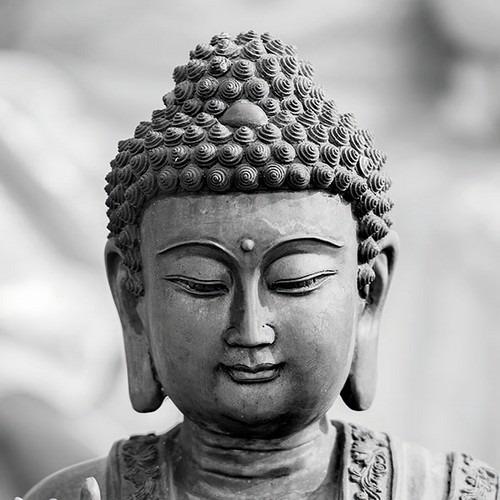VENERABLE MASTER KYUNG-HO'S INSPIRATIONAL TALK

[This document can be acquired from a sub-directory coombspapers via anonymous FTP and/or COOMBSQUEST gopher on the node COOMBS.ANU.EDU.AU]
The document's ftp filename and the full directory path are given in the coombspapers top level INDEX file]
[This version: 23 November 1993]
--------
This file was copied from an archive of Zen Buddhist texts established at Sam Huston Univ, Texas, US on a Gopher Host: oac3.hsc.uth.tmc.edu Path=1/computers/oac_staff/S_Newton/zen
The original document was provided by Steven Newton, <snewton@oac.hsc.uth.tmc.edu> of the Southwest Chogye International Zen Academeia 1375 Bunker Hill Houston, TX 77055 English (713) 467-0998 Korean (713) 467-0997 Fax (713) 467-0998
--------
Notes:
The text of this talk is from a version in the library of the Southwest Chogye Zen Center in Houston, Texas. Master Kyong-Ho (1849-1912) is considered one of the most significant Korean Zen teachers of the modern era. Among his important disciples was Mann-gong (1872-1946) who is the direct dharma ancestor of Hye-Am, teacher of Myo-Bong, who founded the Southwest Chogye Zen Center.
VENERABLE MASTER KYUNG-HO'S
INSPIRATIONAL TALK
1. It is no small thing for a man to become a Bhiku. A man does not become a Bhiku to eat and dress well. Rather, he wants to be free from life and death by accomplishing Buddhahood.
2. To accomplish Buddhahood, one has to discover his own Mind, which is already within his own body.
3. To discover Mind, one should understand that his body is nor more than a dead corpse and this this world is, for good or bad, nothing but a dream. Man's death is like popping out in the evening of the same day that you have popped in during the morning. After death, sometimes one may be born in one of the hells, sometimes in the realm of animals and sometimes in the realm of ghosts. Then one must endure incalculable pains and sufferings.
4. Since this is true do not concern yourself with the worldly life. Just examine and carefully observe your mind at all times. What does this which is now seeing, hearing and thinking look like? Does this have any form or not? It this big or small? Is this yellow or green? Is this bright or dark?
5. Examine and observer this matter carefully. Let your examination and observation become like a mouse-catching cat; or like an egg-laying hen; or like a desperately hungry, old, crafty mouse gnawing a hole in a rice bag. Let your examination and observation be focused at one point and do not forget it. Keep it before you by raising doubt and by questioning yourself. Do not this this doubt go away while you are doing chores or the like. Do not let your question (doubt) escape from you even while you are not doing anything special. By eagerly and sincerely practicing in this manner, finally, there will be the moment of awakening to you own Mind.
6. Study hard by raising your faith. Raising your faith is sincerely re-examining the matter just mentioned.
7. To be born a human being is most difficult. It is even more difficult to be born into favorable circumstances -- harder still to become a Bhiku. It is the most difficult thing of all to find correct and righteous Dharma teaching. We should reflect on this matter deeply.
8. Shakyamuni Buddha once said, One who is already a human being is like a speck of dirt clinging to a fingernail, while the one who has become an animal by losing his human form is as common as the dirt of the ground.
If one loses the human form this time, then one will have to wait countless aeons to recover it. When someone is in the one of the many hells, he is unaware of it, as if playing games in a flower garden. Becoming a hungry ghost, asura, or animal, he acts like he is dwelling in his own home.
9. However, if one is awakened and has accomplished Buddhahood, he does not have to live or die. That is, he does not have to endure any kinds of sufferings again. These words should be carefully considered one by one.
10. Once Zen Master Kwon, a Bhiku, began meditating from morning to night. As soon as the sun would set, he would beat his fists against the ground in frustration and cry out, "I have lost another day without realizing my Mind." He continued this way every day until he was fully awakened. Since there are many who have exhibited the determination of Master Kwon, it is impossible for me here to cite everyone who has had the determination to meditate until enlightened.
11. None of them were worried about living or dying, nor about eating, dressing well, nor sleeping. In our study, we should practice the same way. Consider this carefully!
12. Once Zen Master Tung-san wrote: Do not seek noble titles nor wish to have possessions nor ask for prosperity. Wherever you happen to be, just live in accord with your karma here and now in this life. If your clothes wear out, patch them again and again. If there is no food, barely even search for it.
When the warm energy under your chin grows cold, suddenly you become a corpse. What remains after death is only a hollow name. after all, how many days will this transient body live? Why work hard only to acquire useless things? That only makes your mind dark and causes you to forget about studying.
13. After awakening one's on mind, one should always preserve its purity and tranquillity. Cultivate this mind without allowing it to be tainted by worldly things. Then plenty of good things (that is, pleasure which comes from the Awakening) will happen. Faithfully, trust in this. When you have to die, there will be no more suffering or sickness. You can go freely to Nirvana or anywhere else you chose (i.e., you control your own life as a free man in the world).
14. Shakyamuni Buddha said, If anyone -- man or woman, old or young -- has faith in these words and studies, each will, as a result, become a Buddha.
Why would Shakyamuni Buddha deceive us?
15. The Fifth Patriarch, Hung-yin, the Zen Master, said, By examination and observation of mind, one will become enlightened naturally.
Then he further promised us that,
If you don't have faith in what I say, in future lives you will be eaten by tigers over and over again. On the other hand, if I have deceived you, I will fall into the dungeon of exitless hell.
Since the Patriarchs have said these words, should be not take them to heart?
16. Those of you who are in this Study, do not agitate your mind; let it be like a mountain. Let your mind be like a wide and empty space and continue to reflect on enlightening Dharma like the moon reflects the sun. Whether others think that I am right or wrong is not your concern. Do not judge or criticize others. Just be at ease and go on mindlessly like a simpleton or fool. Or, be like one who is struck deaf and dumb. Spend your life like you cannot hear a thing or like an infant. Then, sooner or later, all the delusion will disappear.
17. If one wishes to accomplish Buddhahood, it is useless to attempt to understand and master the worldly life. It would be like one trying to fix food out of dung, or like trying to cut jade out of mud. It is totally useless for the accomplishing of Buddhahood. there is no reason for occupying oneself completely and thoroughly with worldly affairs.
18. See your own death in the death of others. Do not put your trust in this body. Rather, remind yourself again and again to not miss a moment to awaken your own mind.
19. Ask yourself repeatedly, "What does this mind look like?" In your daily rounds, continue to ask yourself, "What does this mind look like?" Reflect upon this question so intensely that you are like a starving man thinking of nothing but good food. Do not loose hold of your questioning at any time.
20. Buddha has said, Whatever has a form, that is, everything, is all delusory.
He also said,
Everything that the ordinary human being does is subject to life and death. There is only one way for use to be a true man and this is Realization of our own mind.
21. It is said, "Do not drink liquor", since it will intoxicate and make your mind dull. Also, "Do not speak lies", since it will only accelerate delusive states of mind. Furthermore, "Do not steal", since it only helps to make your mind jealous and full of desires. You should observe these and all the precepts. Breaking the precepts can be very harmful for your cultivation and for your life itself. You should not cling to or incline yourself towards breaking any of them.
22. Master Ox-herder, Mokguja (Chinul), once mentioned that, Indulging in craving and desire for property are as vicious as poisonous snakes. Watch your body and mind carefully when such desires arise and then understand them as they are. Detach yourself from them as much as possible.
23. These words are very important and they should be remembered. They will make your study more effective. Buddha said,
Becoming angry even once raises ten million vicious sins.
A student simply must endure and tolerate the angry mind. Many masters have also said that because of anger, man becomes a tiger, a bee, a snake, or some similar stinging or biting creature. From foolish mindedness, man becomes either a bird or a butterfly. Depending upon his degree of low-mindedness, man becomes either an ant, mosquito or the like. From craving things, man becomes a hungry ghost. The type of desire or anger molds the nature of hell into which men will accordingly fall. Each and every state of mind determines the kind of creature man is to become.
24. However, if one's mind is unattached, one becomes a Buddha. Even a "good" or positive state of mind is useless. Even though such a condition of mind can create a heavenly future life, it is still limited. As soon as one reaches heaven, he immediately begins descending to the hellish or animal realms in successive rebirths. If no intention is held in the mind, then there is no place to be born again. One's mind is so pure and unconfused, it cannot go to the dark places. This pure and quiescent mind is the way of Buddha.
25. If one questions with the one-pointed concentration, then this mind naturally settles down and become tranquil. By this he automatically realizes his own mind as quiescent and tranquil. This is the same as becoming a Buddha.
26. This way is very direct and goes right to the point. It is the best way one can practice. Read and examine this talk from time to time and, on the right occasions, even tell other people. This is as good as reading eighty-four thousand volumes of scriptures. Studying in this manner, one will accomplish Buddhahood in this lifetime. Do not understand this talk to be some contrived encouragement or expedient deception. Follow these words with your whole-hearted mind.
27. In the deep canyon where the clear stream is flowing continuously, all kinds of birds are singing everywhere. No one ever comes to visit this place. It is the so-called Bhiku's place (monastery) and is quiet and tranquil. Here is where I sit and contemplate and examine what this mind is. Now, if this mind is not what Buddha is, then what else it?
28. You have just heard a very rare talk. You should continue to study this great matter enthusiastically. Do not hurry, otherwise you might become sick or get a terrible headache. Calm yourself, then ceaselessly meditate. Most of all, be careful not to force yourself. Rather, relax and let your right questioning be within!

















